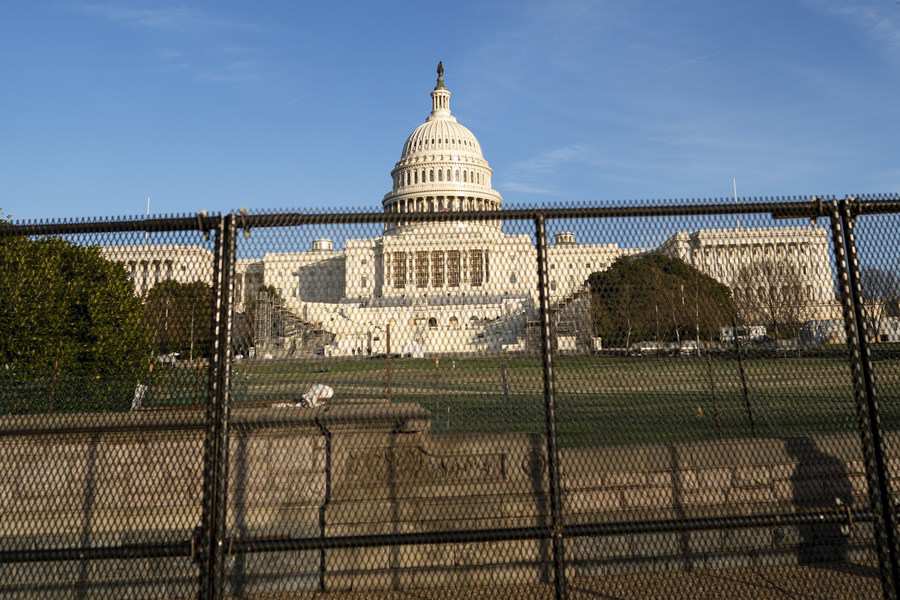


Security staff are seen near the U.S. Capitol building a day after supporters of U.S. President Donald Trump stormed it in Washington, D.C., the United States, Jan. 7, 2021. (Xinhua/Liu Jie)
Resolved to impeach Trump for the second time after they did so in December 2019, House Democrats are expected to expedite the impeachment process by holding a floor vote on the resolution on Wednesday the earliest.
WASHINGTON, Jan. 11 (Xinhua) -- U.S. House Democrats on Monday formally introduced the article of impeachment against President Donald Trump, taking the first step to impeach the president the second time during his presidency.
The single article of impeachment, contained in a resolution introduced while the House gaveled into a pro-forma session, charged the president with "incitement of insurrection," pointing to his repeated false claims that the 2020 presidential election was stolen from him.
Those claims and a speech Trump delivered to supporters in Washington on Jan. 6 incited a group of rioters to breach the Capitol as Congress convened a joint session to certify President-elect Joe Biden's victory in the election, the resolution said.
The resolution also cited Trump's phone call on Jan. 2 with Georgia Secretary of State Brad Raffensperger, in which the president urged the secretary to find enough votes to overturn the election results in the state, as one of a series of efforts by the president to subvert and obstruct the certification of the election results.
"In all this, President Trump gravely endangered the security of the United States and its institutions of Government," the resolution said. "He threatened the integrity of the democratic system, interfered with the peaceful transition of power, and imperiled a coequal branch of Government. He thereby betrayed his trust as President, to the manifest injury of the people of the United States."

Concrete road barriers are seen near the U.S. Capitol building a day after supporters of U.S. President Donald Trump stormed it in Washington, D.C., the United States, Jan. 7, 2021. (Xinhua/Liu Jie)
Citing the 14th Amendment of the U.S. Constitution, the resolution noted that the law "prohibits any person who has 'engaged in insurrection or rebellion against' the United States" from holding office.
Calling Trump "a threat to national security, democracy, and the Constitution if allowed to remain in office," the resolution said the president "thus warrants impeachment and trial, removal from office, and disqualification to hold and enjoy any office of honor, trust, or profit under the United States."
Resolved to impeach Trump for the second time after they did so in December 2019, House Democrats are expected to expedite the impeachment process by holding a floor vote on the resolution on Wednesday the earliest.
Before unveiling the impeachment resolution, House Democrats sought to pass a separate, nonbinding resolution through unanimous consent asking Vice President Mike Pence to invoke the 25th Amendment of the Constitution with a majority of Trump administration Cabinet members to remove the president from office.

A security staff member is seen near the U.S. Capitol building a day after supporters of U.S. President Donald Trump stormed it in Washington, D.C., the United States, Jan. 7, 2021. (Xinhua/Liu Jie)
That effort was shot down by Republicans in the chamber. As a result, Democrats will hold a floor vote on Tuesday on the resolution requesting the direct removal of the president absent the impeachment and the subsequent Senate trial.
Pence, who initially inclined not to invoke the 25th Amendment but who per a more recent CNN report hasn't ruled out that possibility, was given 24 hours to respond to the resolution, or the impeachment will proceed.
The introduction of the impeachment resolution came not only as calls for Trump to resign or be forced out grew among a majority of Democrats and some Republicans following the violent intrusion of the Capitol, but also at a time when Trump has less than 10 days left as the occupant of the White House.
House Majority Whip James Clyburn said on CNN's "State of the Union" on Sunday that while the House is poised to impeach Trump this week, Democrats may wait until after the 100th day since Biden assumes office to deliver the articles of impeachment to the Senate for a trial.
Such a tactic is aimed at not letting the trial complicate congressional proceedings of the incoming president's policy agenda, including Senate confirmations of the president-elect's nominations for key administration posts. Biden's inauguration is scheduled for Jan. 20.

The U.S. Capitol building is seen a day after supporters of U.S. President Donald Trump stormed it in Washington, D.C., the United States, Jan. 7, 2021. (Xinhua/Liu Jie)
Senate Majority Leader Mitch McConnell said in a memo circulated among Republicans last week that he would not call the Senate - now in recess -- back in session before Jan. 19, meaning that the earliest possible time for the chamber to conduct the impeachment trial is on Biden's inauguration day.
If that were to happen, Trump would be the first U.S. president in history to be tried on impeachment charges in the Senate trial after stepping down. Michael Gerhardt, a law professor at the University of North Carolina at Chapel Hill, said he didn't see "any constitutional problem with the Senate acting fast or slowly," suggesting that for a president to be tried during an impeachment trial as a defendant after he leaves office doesn't violate the Constitution.
The enthusiasm for impeaching and convicting the president remained low among many Republicans.
Meanwhile, a number of GOP senators, including Lisa Murkowski of Alaska and Pat Toomey of Pennsylvania, have called on the president to resign in the wake of the Capitol insurrection. Nebraska GOP senator Ben Sasse publicly said he would "definitely consider whatever articles (of impeachment)" the House delivers to the Senate, for he believed that Trump "has disregarded his oath of office."

 Award-winning photos show poverty reduction achievements in NE China's Jilin province
Award-winning photos show poverty reduction achievements in NE China's Jilin province People dance to greet advent of New Year in Ameiqituo Town, Guizhou
People dance to greet advent of New Year in Ameiqituo Town, Guizhou Fire brigade in Shanghai holds group wedding
Fire brigade in Shanghai holds group wedding Tourists enjoy ice sculptures in Datan Town, north China
Tourists enjoy ice sculptures in Datan Town, north China Sunset scenery of Dayan Pagoda in Xi'an
Sunset scenery of Dayan Pagoda in Xi'an Tourists have fun at scenic spot in Nanlong Town, NW China
Tourists have fun at scenic spot in Nanlong Town, NW China Harbin attracts tourists by making best use of ice in winter
Harbin attracts tourists by making best use of ice in winter In pics: FIS Alpine Ski Women's World Cup Slalom
In pics: FIS Alpine Ski Women's World Cup Slalom Black-necked cranes rest at reservoir in Lhunzhub County, Lhasa
Black-necked cranes rest at reservoir in Lhunzhub County, Lhasa China's FAST telescope will be available to foreign scientists in April
China's FAST telescope will be available to foreign scientists in April